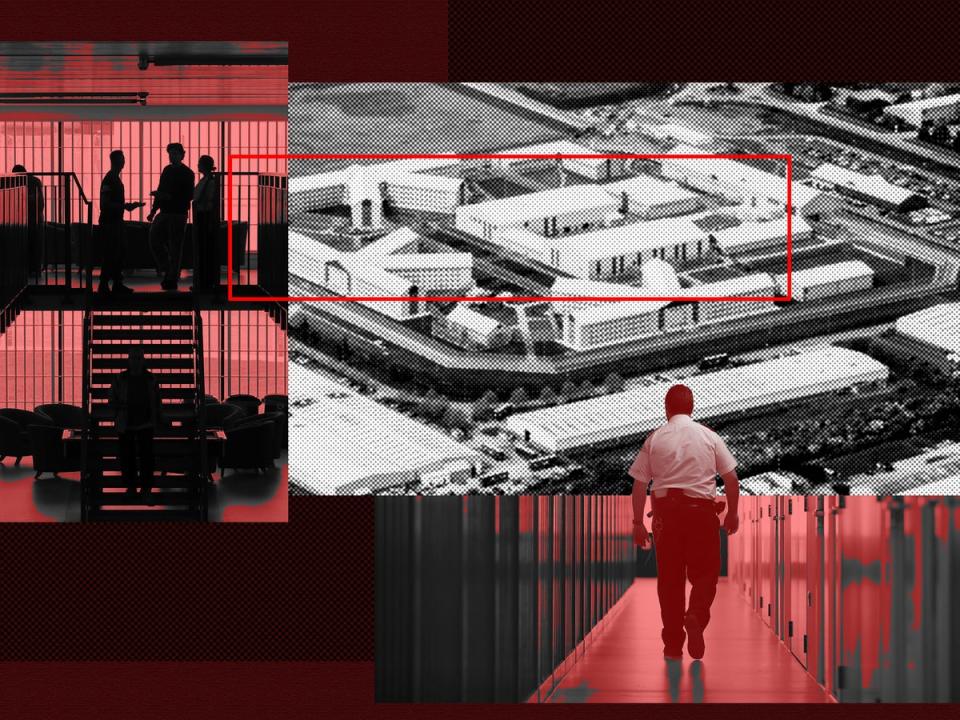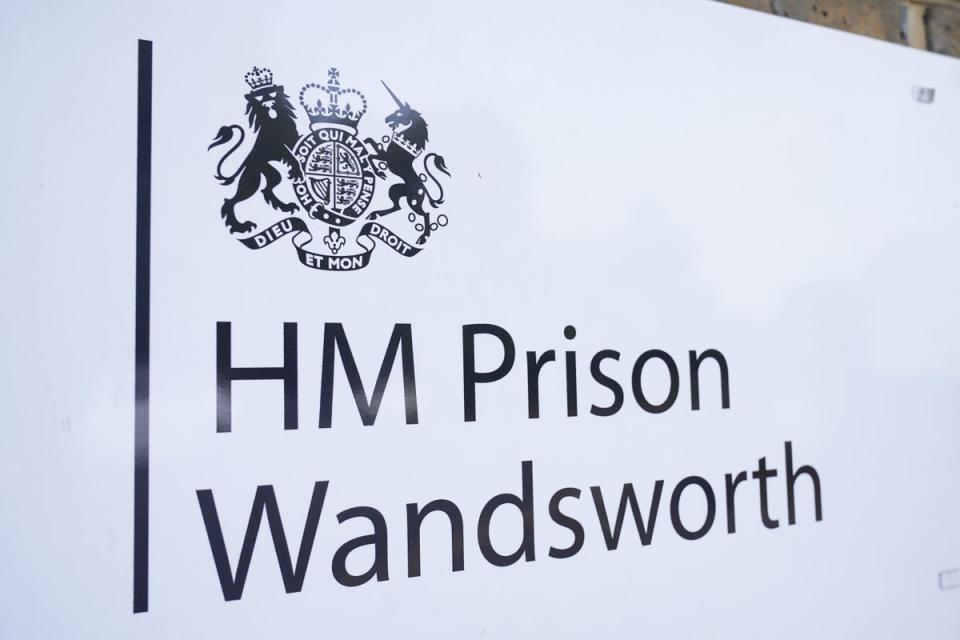Criminals may be freed early to ease overcrowding as prison crisis laid bare
Criminals may be released from jail early or not locked up in the first place as figures uncovered by The Independent show overcrowding in prisons is nearing breaking point.
New statistics reveal the majority of prisons are now dangerously full, with some – including Wandsworth, where ex-soldier Daniel Khalife is accused of escaping – holding 70 per cent more inmates than they should.
The shortfall prompted warnings from the chief of prison governors, former home secretary Jack Straw and former Tory prisons minister Rory Stewart, who all warned that early release may have to be considered to tackle the crisis.
Talk of the drastic measure comes as:
Latest figures show nearly two-thirds of jails in England are officially overcrowded with just 768 free spaces within the entire prison estate
A prison union threatened to take legal action if the Ministry of Justice asked governors to find extra capacity in already packed prisons
The HM inspector of prisons said prisoners were already being asked to double up in cells to avert crisis
Experts warned of the longer-term problem of accommodating prisoners, even if short-term fixes are found
The prison governors chief warned the “nuclear button could be pressed very soon”, as the system runs dangerously close to capacity.
Andrea Albutt, president of the Prison Governor’s Association (PGA), said it was “common sense” that the government would have to consider an early release scheme for thousands of prisons, adding: “The fact is we’re overcrowded to the nth degree and there is no capacity left. Once we are full, we are full.”
She said: “We are reaching the critical point. The point of no return. In the adult male estate, there are only a few hundred spaces left, and that will be consumed in the next couple of weeks.”

Mr Straw, who as Labour’s justice secretary oversaw an early release scheme for prisoners, said although he was not updated on the current state of prisons, the government was facing a “perfect storm” arising from “the willful neglect of the whole criminal justice system over the past 13 years”.
Discussing early release, he went on: “The government would find that very uncomfortable, but they may have to do it.
“Rishi Sunak, Suella Braverman and Alex Chalk need to realise the state of crisis and that the government is failing in one of its fundamental duties, to keep people safe.”
And Mr Stewart said those in power should “have the courage” to abolish short prison sentences for minor offenders in a bid to tackle the issue.
“The only way of addressing this is for a political party to have the courage to reduce the prison population. They will never be able to build enough prisons to keep up.
“Let’s abolish short sentences in prison for minor offences and let’s reduce the length of sentences. We should be learning from Europe, not the United States, and locking up fewer people.”
The UK’s prison population has been steadily rising since 2020 and there are now 87,793 inmates locked up. As of 29 September, capacity across the whole estate stood at 88,561.
HMP Wandsworth is at 170 per cent occupancy, according to August statistics from the Ministry of Justice. HMP Leeds is currently at 172 per cent occupancy, and HMP Durham is at 171 per cent.
The government estimates these figures will only get worse, with the prison population expected to increase to between 93,100 and 106,300 by March 2027.
Justice committee chair Sir Bob Neill has warned that even if the new prisons in the pipeline are completed on time, there would still be a shortfall in March 2025 of 2,300 places.

HM inspector of prisons Charlie Taylor warned prisons may “hit a crisis point in the next six months to a year” but said that temporary measures, such as using police cells under a scheme known as “operation safeguard”, could alleviate this. However, he expressed concern that this will eventually come to a head as the prison population grows.
Police cells have been used to house prisoners 871 times between February — when the scheme started — and June.
Mr Taylor said: “In the longer term there’s a much more protracted problem where we won’t be able to accommodate people anymore. You’ve got three choices; you either build a bigger bath, let some of the water out of the bath, or turn the taps off.
“Overcrowding affects everything – it means prisons spend longer locked up, there’s more pressure on showers, pressure on getting out for exercise, rising levels of violence.”
A prison is classified as overcrowded if the number of prisoners held exceeds the Certified Normal Accommodation (CNA). The CNA is set by the prison service and is the number of spots available for prisoners under a decent standard of accommodation. The operational capacity is the absolute maximum number of prisoners that could fit into the prison.

Analysis by The Independent shows that 78 out of 124 jails in England and Wales have a population greater than the number of CNA spaces.
The Ministry of Justice has said is it taking measures to “reduce the demand pressures on the system, including increasing (within safe limits) the number of prisoners held in the existing estate, and bringing non-critical maintenance cells back online”.
All “non-critical maintenance work” has also been paused. The department has also expanded the Home Detention Curfew scheme, allowing prisoners to be released from jail earlier under conditions such as tagging.
Internal analysis from May found this would free up 300 prison spaces. Magistrates have also been told to “have an awareness of the impact of the current prison population levels” when sentencing.
Ms Albutt said the situation was making work very dangerous for governors, adding: “If the government further overcrowd our prisons, if they say to our members ‘you will put more people in your already overcrowded prison’, we will take legal action.”
Labour MP Andy Slaughter, who has HMP Wormwood Scrubs in his constituency, has written to the justice secretary to share his concerns about the “underlying problems” of staffing and overcrowding.
He added that overcrowding could actually be worse than is realised. “When I met with the governor of Wormwood Scrubs, she told me the Ministry of Justice had only recently asked her to increase operational capacity. How can we know the real rates of overcrowding if the government just increases the capacity of a prison at will?”
David Shipley, who spent time in Wandsworth for fraud in 2020, said overcrowding has led to slipping standards: “Often Wandsworth felt like a barely controlled nightmarish inner-city comprehensive.
“There were so many prisoners that you would have one, two, three staff on a wing with a few hundred prisoners. Often they wouldn’t have the energy or capacity to really enforce standards of behaviour.”
He described one incident when he walked onto a wing to see a prisoner smoking a spliff. When the prison officer told him he couldn’t smoke, the prisoner just laughed and walked away.
A Ministry of Justice spokesperson said: “We will always ensure there are enough cells to lock up dangerous criminals and keep the public safe.
“We’re pressing ahead with the biggest expansion of prison places in over a century – delivering 20,000 additional spaces including six new jails. Around 5,500 new places have already been delivered including HMP Fosse Way and we’ve created short-term capacity by doubling up cells where it is safe to do so and delaying non-urgent maintenance work.”


